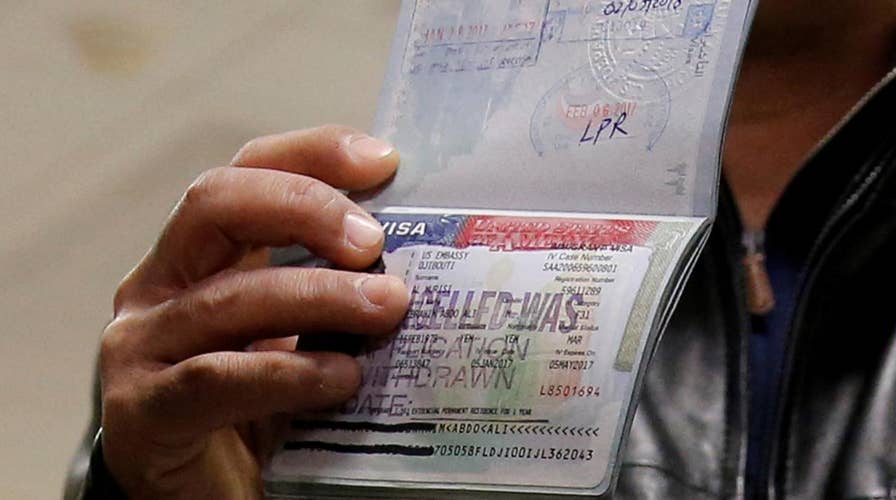What is the diversity visa program?
President Trump is blasting and calling for the end of the diversity visa program after the deadly New York City terror attack. What is the diversity visa program and who is coming to the U.S. through it?
Tuesday's terrorist attack in New York City has shined a spotlight on an immigration program that critics argue has no justification -- the .
The program awards about 50,000 green cards every year to immigrants chosen at random from among millions of applicants. Congress created it in 1990 to encourage immigration from countries that traditionally have sent small numbers of people to the United States. Sen. Chuck Schumer (D-N.Y.) drafted the language creating the program when he was a member of the House of Representatives.
The Diversity Visa Lottery Program has been in the crosshairs before. The so-called Gang of Eight amnesty bill in 2013 would have eliminated it as part of a broader package. The Reforming American Immigration for Strong Employment (RAISE) Act, this year to switch to a merit-based immigration system, also would eliminate the program.
President Donald Trump argued for its elimination in a he released last month as part of any deal to grant amnesty to illegal immigrants brought to America as children.
More From LifeZette.com
Trump blasted the program on Twitter on Wednesday after reports that Sayfullo Saipov, accused of killing eight people and injuring 15 by driving a pickup truck down a bike path in Lower Manhattan, came to the United States from his native Uzbekistan in 2010 through the diversity lottery.
"The terrorist came into our country through what is called the "Diversity Visa Lottery Program," a Chuck Schumer beauty. I want merit based," he tweeted.
Schumer, the Senate minority leader, responded on the Senate floor by knocking Trump for trying to cut off federal funds to New York City and other so-called "sanctuary" jurisdictions that do not fully cooperate with immigration authorities.
"Instead of dividing, instead of politicizing, do something real, Mr. President," he said. "Restore these funds. Now."
Citizens of Uzbekistan have been among the greatest beneficiaries of the lottery program. Statistics from the State Department indicate that 3,356 people from the former Soviet republic received visas through the program the year Saipov came in 2010. In fiscal year 2016, 2,378 Uzbeks won the lottery, making Uzbekistan the fifth highest of any country.
Immigration and Customs Enforcement officials in 2011 placed Uzbekistan on a list of "specially designated countries that have shown a tendency to promote, produce or protect terrorist organizations or their members." Three other countries on that list -- Egypt, Iran and Sudan -- ranked in the top seven nations with the most diversity lottery winners in fiscal year 2016.
"Clearly, there is a terrorism vulnerability angle for this program that is greater than other programs," said Mark Krikorian, executive director of the Center for Immigration Studies.
Krikorian noted that the diversity lottery accounts for a disproportionate share of immigrants from several countries on the list. The program makes up about 5 percent of all immigration but 58 percent of migrants from Uzbekistan and Algeria came from the program in fiscal year 2015, he said. It was 26 percent of immigration from Turkey and 27 percent form Sudan.
Krikorian pointed to numerous reports of people using fake documents to enter through the diversity lottery.
"The lottery is even more susceptible to fraud than other immigration programs," he said.
Chris Chmielenski, director of content and activism at NumbersUSA, said terrorism is only one concern.
"It is broader than that," he said. "We're talking about a world power, and we simply have a random lottery ... It's simply ridiculous."
Sen. David Perdue (R-Ga.), one of the sponsors of the RAISE Act, renewed calls on Wednesday for its passage.
"I hope we can include this area of common ground as we work to fix our broken immigration system and strengthen our national security," he said in a statement.
The program requires applicants to have a high school degree or equivalent and must submit to a background check, but other than that, Chmielenski said, there are few strings attached. He said there is no consideration given to whether the lottery winners will bring skills or education that could improve the United States.
"It doesn't serve the national interest," he said. "It doesn't help the economy. It doesn't help workers at all."
Chmielenski noted that a commission headed by Barbara Jordan, a former Democratic congresswoman from Texas, called in the 1990s for scrapping the program. He said NumbersUSA also has polled on the issue.
"It has very little support amongst the American people, especially among voters," he said.
But Democratic politicians tend to opposed eliminating the program unless it is tied to a broad amnesty.
"This is not an issue that is resolved in a tweet or my interview with you right now right now," Rep. Tom Suozzi (D-N.Y.) told CNN's Poppy Harlow on Wednesday. "This is part of comprehensive immigration reform."
Krikorian said the program has its roots in efforts by Democratic members of Congress to protect illegal immigrants from Ireland who did not qualify for the 1986 amnesty passed by Congress. He said the Congressional Black Caucus has fought to protect it because its members see it has a way to promote more immigration from Africa.
"The whole concept is repellant," he said. "This program was created for identity-politics reasons and now persists for different identity-politics reasons."










































